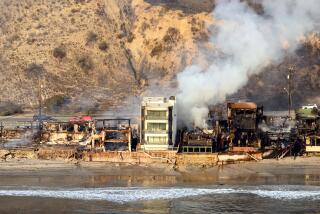Homeowner Finds Evidence of Fire Not Mentioned During Sale
- Share via
Question: Shortly after buying my home, I repainted the hall ceiling. When I lifted the attic access cover, I found that the roof framing was burnt. This can be clearly seen through the opening, yet nothing about this was mentioned by my home inspector. In fact, the report lists the attic as being in good condition.
I contacted the broker, the agent, the inspector and the sellers, but everyone denies responsibility. The inspector says he did not see it, and everyone else claims to know nothing about it.
Who is responsible for this lack of disclosure?
Answer: Failure of a home inspector to observe fire damage in an accessible portion of an attic constitutes professional negligence. However, the primary consideration is whether you are observing significant fire damage or merely blackened surfaces.
It is possible that all necessary repairs were done in the aftermath of the fire, but further evaluation should be done to make that determination. This, of course, does not eliminate the responsibility for disclosure by concerned parties, but your first priority is to determine whether corrective work is warranted.
With regard to the sellers’ liability, you should determine when the fire occurred. If it was before their ownership, they may have been unaware of it.
Consult your local fire department and request a copy of its official report. This is a permanent public record, which shows when the fire took place, its determined cause and possibly an evaluation of the damage. If the fire happened during the sellers’ ownership, they would be guilty of failure to disclose.
The likelihood that the broker or agent was aware of the attic’s condition is remote. Realtors perform a due diligence walk-through inspection, but this does not involve accessing attics or other concealed portions of buildings. Unless they were specifically informed by a seller or neighbor, they were probably unaware of this condition.
Remember, the main issue is whether repairs are needed at this time. If you’re merely observing charred wood surfaces, your concerns may be unwarranted.
Drywall Screws Versus Wood Ones
Q: Recently you recommended substandard drywall screws, rather than wood screws, to secure loose floor boards. Why did you do that? Drywall screws have weaker heads and incorrect threading ratio for wood applications.
A: The reason for recommending drywall screws for quieting squeaky floors is that they are much easier to use than wood screws. I agree that wood screws have a stronger shank at the base of the head. But for this application, the strength differential and thread ratios are not significant issues. Securing a loose floor board is not a structural repair. The degree of stress being applied to the screws for this kind of upgrade is negligible.
If we were discussing the attachment of a support ledger or shear bracing, the choice of screws could be consequential.
In this case, the likelihood of adverse effects is practically nonexistent.
Many Possible Causes of Cracks
Q: Cracks have appeared in my kitchen walls, near the window corners and in my slab floor, visible beneath the linoleum. A contractor says the house has settled on that side. The home is just over 10 years old, and I would think cracks would have appeared earlier. I should also mention that the house had serious fire damage about four years ago and needed extensive reconstruction. Do you think I have a serious problem?
A: An accurate response to your question requires an on-site evaluation by a qualified expert. Cracks in the walls and concrete slab could be due to expansive soil, faulty ground drainage or other causes. Apparent settlement could be minor in nature or symptomatic of a major structural problem. It could also indicate substandard materials or workmanship when the fire damage was repaired.
For a review of these conditions, have the property evaluated by a licensed structural engineer or experienced home inspector.
For recommendations, contact several real estate offices in your area.
*
If you have questions or comments, contact Barry Stone through his Web site at https://www.housedetective.com. Distributed by Access Media Group.


